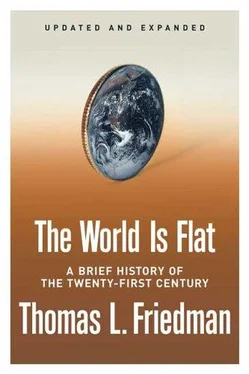Warning: What I said when I put forth the McDonald's theory, I would repeat even more strenuously with the Dell Theory: It does not make wars obsolete. And it does not guarantee that governments will not engage in wars of choice, even governments that are part of major supply chains. To suggest so would be naive. It guarantees only that governments whose countries are enmeshed in global supply chains will have to think three times, not just twice, about engaging in anything but a war of self-defense. And if they choose to go to war anyway, the price they will pay will be ten times higher than it was a decade ago and probably ten times higher than whatever the leaders of that country think. It is one thing to lose your McDonald's. It's quite another to fight a war that costs you your place in a twenty-first-century supply chain that may not come back around for a long time.
While the biggest test case of the Dell Theory is China versus Taiwan, the fact is that the Dell Theory has already proved itself to some degree in the case of India and Pakistan, the context in which I first started to think about it. I happened to be in India in 2002, when its just-in-time services supply chains ran into some very old-time geopolitics-and the supply chain won. In the case of India and Pakistan, the Dell Theory was working on only one party-India-but it still had a major impact. India is to the world's knowledge and service supply chain what China and Taiwan are to the manufacturing ones. By now readers of this book know all the highlights: General Electric's biggest research center outside the United States is in Bangalore, with seventeen hundred Indian engineers, designers, and scientists. The brain chips for many brand-name cell phones are designed in Bangalore. Renting a car from Avis online? It's managed in Bangalore. Tracing your lost luggage on Delta or British Airways is done from Bangalore, and the backroom accounting and computer maintenance for scores of global firms are done from Bangalore, Mumbai, Chennai, and other major Indian cities. Here's what happened: On May 31, 2002, State Department spokesman Richard Boucher issued a travel advisory saying, “We urge American citizens currently in India to depart the country,” because the prospect of a nuclear exchange with Pakistan was becoming very real. Both nations were massing troops on their borders, intelligence reports were suggesting that they both might be dusting off their nuclear warheads, and CNN was flashing images of people flooding out of India. The global American firms that had moved their back rooms and R & D operations to Bangalore were deeply unnerved.
“I was actually surfing on the Web, and I saw a travel advisory come up on India on a Friday evening/' said Vivek Paul, president of Wipro, which manages backroom operations from India of many American multinationals. ”As soon as I saw that, I said, 'Oh my gosh, every customer that we have is going to have a million questions on this.' It was the Friday before a long weekend, so over the weekend we at Wipro developed a fail-safe business continuity plan for all of our customers.“ While Wipro's customers were pleased to see how on top of things the company was, many of them were nevertheless rattled. This was not in the plan when they decided to outsource mission-critical research and operations to India. Said Paul, ”I had a CIO from one of our big American clients send me an e-mail saying, I am now spending a lot of time looking for alternative sources to India. I don't think you want me doing that, and I don't want to be doing it.' I immediately forwarded his message to the Indian ambassador in Washington and told him to get it to the right person.“ Paul would not tell me what company it was, but I have confirmed through diplomatic sources that it was United Technologies. And plenty of others, like American Express and General Electric, with back rooms in Bangalore, had to have been equally worried.
For many global companies, “the main heart of their business is now supported here,” said N. Krishnakumar, president of MindTree, another leading Indian knowledge outsourcing firm based in Bangalore. “It can cause chaos if there is a disruption.” While not trying to meddle in foreign affairs, he added, “What we explained to our government, through the Confederation of Indian Industry, is that providing a stable, predictable operating environment is now the key to India's development.” This was a real education for India's elderly leaders in New Delhi, who had not fully absorbed how critical India had become to the world's knowledge supply chain. When you are managing vital backroom operations for American Express or General Electric or Avis, or are responsible for tracing all the lost luggage on British Airways or Delta, you cannot take a month, a week, or even a day off for war without causing major disruptions for those companies. Once those companies have made a commitment to outsource business operations or research to India, they expect it to stay there. That is a major commitment. And if geopolitics causes a serious disruption, they will leave, and they will not come back very easily. When you lose this kind of service trade, you can lose it for good.
“What ends up happening in the flat world you described,” explained Paul, “is that you have only one opportunity to make it right if something [goes] wrong. Because the disadvantage of being in a flat world is that despite all the nice engagements and stuff and the exit barriers that you have, every customer has multiple options, and so the sense of responsibility you have is not just out of a desire to do good by your customers, but also a desire for self-preservation.”
The Indian government got the message. Was India's central place in the world's services supply chain the only factor in getting Prime Minister Vajpayee to tone down his rhetoric and step back from the brink? Of course not. There were other factors, to be sure-most notably the deterrent effect of Pakistan's own nuclear arsenal. But clearly, India's role in global services was an important additional source of restraint on its behavior, and it was taken into account by New Delhi. “I think it sobered a lot of people,” said Jerry Rao, who, as noted earlier, heads the Indian high-tech trade association. “We engaged very seriously, and we tried to make the point that this was very bad for Indian business. It was very bad for the Indian economy... [Many people] didn't realize till then how suddenly we had become integrated into the rest of the world. We are now partners in a twenty-four by seven by three-sixty-five supply chain.”
Vivek Kulkami, then information technology secretary for Bangalore's regional government, told me back in 2002, “We don't get involved in politics, but we did bring to the government's attention the problems the Indian IT industry might face if there were a war.” And this was an altogether new factor for New Delhi to take into consideration. “Ten years ago, [a lobby of IT ministers from different Indian states] never existed,” said Kulkarni. Now it is one of the most important business lobbies in India and a coalition that no Indian government can ignore.
“With all due respect, the McDonald's [shutting] down doesn't hurt anything,” said Vivek Paul, “but if Wipro had to shut down we would affect the day-to-day operations of many, many companies.” No one would answer the phones in call centers. Many e-commerce sites that are supported from Bangalore would shut down. Many major companies that rely on India to maintain their key computer applications or handle their human resources departments or billings would seize up. And these companies did not want to find alternatives, said Paul. Switching is very difficult, because taking over mission-critical day-to-day backroom operations of a global company takes a great deal of training and experience. It's not like opening a fast-food restaurant. That was why, said Paul, Wipro's clients were telling him, “'I have made an investment in you. I need you to be very responsible with the trust I have reposed in you.' And I think that created an enormous amount of back pressure on us that said we have to act in a responsible fashion... All of a sudden it became even clearer that there's more to gain by economic gains than by geopolitical gains. [We had more to gain from building] a vibrant, richer middle class able to create an export industry than we possibly could by having an ego-satisfying war with Pakistan.” The Indian government also looked around and realized that the vast majority of India's billion people were saying, “I want a better future, not more territory.” Over and over again, when I asked young Indians working at call centers how they felt about Kashmir or a war with Pakistan, they waved me off with the same answer: “We have better things to do.” And they do. America needs to keep this in mind as it weighs its overall approach to outsourcing. I would never advocate shipping some American's job overseas just so it will keep Indians and Pakistanis at peace with each other. But I would say that to the extent that this process happens, driven by its own internal economic logic, it will have a net positive geopolitical effect. It will absolutely make the world safer for American kids.
Читать дальше












